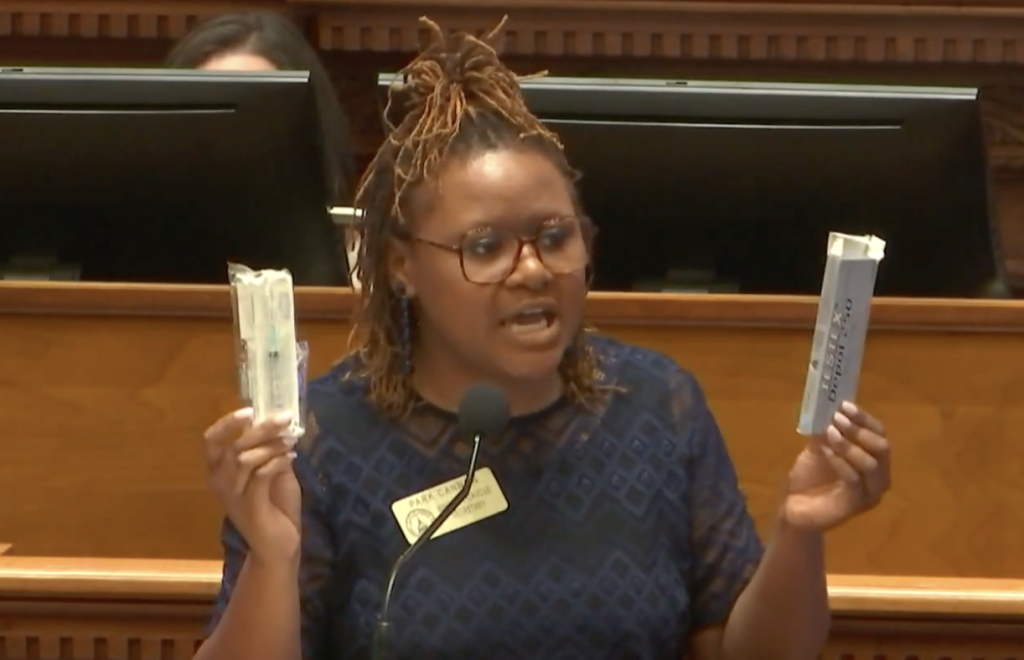House advances bill allowing lawsuits for gender-affirming care on minors
Published 2:34 pm Thursday, March 16, 2023

- Democrat Ga. Rep. Park Cannon holds what she says are black market drugs for gender-affirming care as she spoke against a proposed Georgia law that would prohibit certain surgeries and therapies for transgender minors.Screenshot from a March 16 recording from the Georgia House of Representatives
ATLANTA — After emotional testimony from House Democrats opposed to banning medical care for gender dysphoria in minors, nearly all Republicans voted to advance a bill they say will protect children.
The 95-75 vote for Senate Bill 140 favored prohibiting sex reassignment surgeries or any other surgical procedures and hormone replacement therapies that are performed on anyone younger than age 18 for the purpose of altering primary or secondary sexual characteristics.
“As parents, our role is to help our kids navigate through the confusion of growing up in a society that is often over sexualized and wants to place children in situations to make adult decisions they are not capable of processing,” said Rep. Josh Bonner, House sponsor of the bill.
“As legislators we’re charged with protecting the vulnerable population in the state,” he said ahead of the March 16 vote. “Senate Bill 140 does just that by establishing guardrails to ensure that children struggling with identity issues are not rushing into decisions that would alter their bodies forever.”
Following the favorable vote for the bill, the House voted to immediately transfer its substitute back to the Senate.
The substitute version removed the Senate’s language that would have exempted physicians who violate the law from civil or criminal liability if damages, injuries or loss to any person occurs from their actions.
Nearly a dozen Democrats took their turns speaking against the bill, voicing concerns of the impact it could have on the mental health of transgender children, citing studies that indicate transgender youth have a much higher rate of suicide than any demographic of children.
Rep. Shelly Hutchison, a mental health professional, said the purported increase in transgender children is not from the influence of social media, the internet or other forms of exposure, as asserted by Bonner.
“The cases are going up because we are recognizing them, we are hearing them, we’re talking to them and they know that we see them,” Hutchison said. “They know that they can get help from us. And they feel comfortable — slowly but surely — coming to us when they’re thinking of harming themselves. This is a win for the mental health committee.”
Democrats also argued that attacks against transgender youth appear to have become a focus of Republican lawmakers.
“I don’t know how transgender children have become a political punching bag but I think it’s wrong,” Democrat Scott Holcomb said.
“We don’t need this far-right culture war to continue to divide us. Politicians should not be substituting their personal opinions for doctors,” added Rep. Sam Park, deputy whip in the Georgia House Democratic Caucus.
Alabama enacted a similar law last year, the Alabama Vulnerable Child Compassion and Protection Act, which is currently being challenged in the U.S. Northern District Court of Alabama.
The bill would punish parents and physicians involved in prescribing hormone-altering medications or puberty blockers, and perform gender altering surgeries on people younger than 19 years old.
Anyone found guilty could be charged with a Class C felony, punishable of up to 10 years in prison.
In an order blocking the law form taking effect pending trial, a judge said Alabama’s law is likely unconstitutional, stating “parents have a fundamental right to direct the medical care of their children subject to accepted medical standards; and discrimination based on gender-nonconformity equates to sex discrimination.”
“What this Court said is is that even though sometimes medications, sometimes procedures may be risky, what’s most important is that a parent should have the ability to determine what is best for their child,” Rep. Omari Crawford, a Democrat said. “That is one of the oldest rights in this country. This bill makes no exception for that.”
American Academy of Pediatrics and other health groups have released statements against bills targeting a group that already has a statistically higher rates of depression and suicidal ideation. Around half of transgender youth consider suicide, and a third attempt it, according to AAP.
But Republican Rep. Ginny Ehrhart, the majority caucus secretary, voiced concern there are no long-term studies that shows that gender dysphoria interventions are safe and effective.
Republican Mark Newton said the gender dysphoria treatments proposed for prohibition should be reserved for adult-aged persons who are able to make more informed decisions.
“When a child’s brain is more developed they can more fully understand, as an adult, the potential side effects of surgical and chemical treatments that can cause irreversible results,” he said. “We all agree, I think, that children do deserve care, including mental health care, they deserve compassion. This bill offers them the opportunity to be the adult that makes an informed decision on a permanent irreversible change to their own body.”




